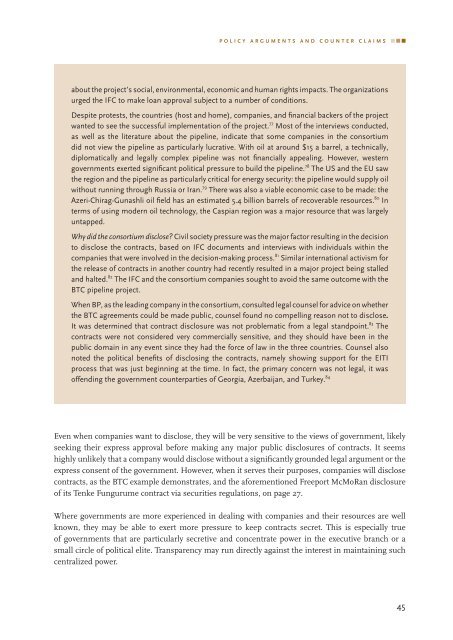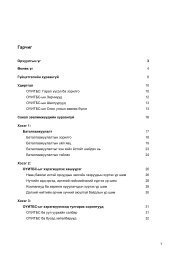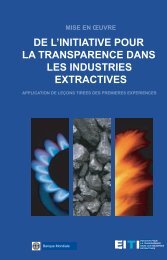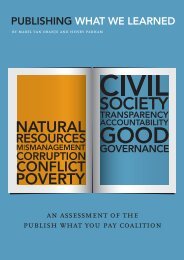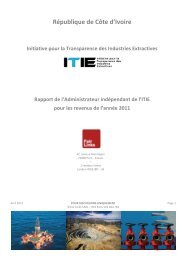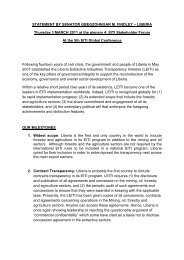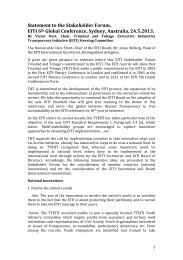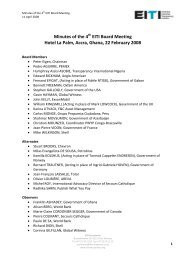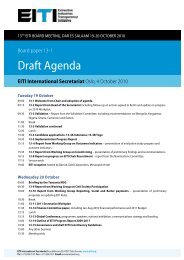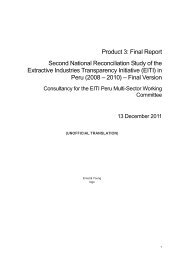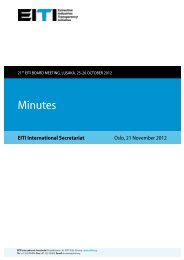CONTRACTS CONFIDENTIAL: - Good Law and Practice
CONTRACTS CONFIDENTIAL: - Good Law and Practice
CONTRACTS CONFIDENTIAL: - Good Law and Practice
Create successful ePaper yourself
Turn your PDF publications into a flip-book with our unique Google optimized e-Paper software.
POLICY ARGUMENTS AND COUNTER CLAIMS<br />
about the project’s social, environmental, economic <strong>and</strong> human rights impacts. The organizations<br />
urged the IFC to make loan approval subject to a number of conditions.<br />
Despite protests, the countries (host <strong>and</strong> home), companies, <strong>and</strong> financial backers of the project<br />
wanted to see the successful implementation of the project. 77 Most of the interviews conducted,<br />
as well as the literature about the pipeline, indicate that some companies in the consortium<br />
did not view the pipeline as particularly lucrative. With oil at around $15 a barrel, a technically,<br />
diplomatically <strong>and</strong> legally complex pipeline was not financially appealing. However, western<br />
governments exerted significant political pressure to build the pipeline. 78 The US <strong>and</strong> the EU saw<br />
the region <strong>and</strong> the pipeline as particularly critical for energy security: the pipeline would supply oil<br />
without running through Russia or Iran. 79 There was also a viable economic case to be made: the<br />
Azeri-Chirag-Gunashli oil field has an estimated 5.4 billion barrels of recoverable resources. 80 In<br />
terms of using modern oil technology, the Caspian region was a major resource that was largely<br />
untapped.<br />
Why did the consortium disclose? Civil society pressure was the major factor resulting in the decision<br />
to disclose the contracts, based on IFC documents <strong>and</strong> interviews with individuals within the<br />
companies that were involved in the decision-making process. 81 Similar international activism for<br />
the release of contracts in another country had recently resulted in a major project being stalled<br />
<strong>and</strong> halted. 82 The IFC <strong>and</strong> the consortium companies sought to avoid the same outcome with the<br />
BTC pipeline project.<br />
When BP, as the leading company in the consortium, consulted legal counsel for advice on whether<br />
the BTC agreements could be made public, counsel found no compelling reason not to disclose.<br />
It was determined that contract disclosure was not problematic from a legal st<strong>and</strong>point. 83 The<br />
contracts were not considered very commercially sensitive, <strong>and</strong> they should have been in the<br />
public domain in any event since they had the force of law in the three countries. Counsel also<br />
noted the political benefits of disclosing the contracts, namely showing support for the EITI<br />
process that was just beginning at the time. In fact, the primary concern was not legal, it was<br />
offending the government counterparties of Georgia, Azerbaijan, <strong>and</strong> Turkey. 84<br />
Even when companies want to disclose, they will be very sensitive to the views of government, likely<br />
seeking their express approval before making any major public disclosures of contracts. It seems<br />
highly unlikely that a company would disclose without a significantly grounded legal argument or the<br />
express consent of the government. However, when it serves their purposes, companies will disclose<br />
contracts, as the BTC example demonstrates, <strong>and</strong> the aforementioned Freeport McMoRan disclosure<br />
of its Tenke Fungurume contract via securities regulations, on page 27.<br />
Where governments are more experienced in dealing with companies <strong>and</strong> their resources are well<br />
known, they may be able to exert more pressure to keep contracts secret. This is especially true<br />
of governments that are particularly secretive <strong>and</strong> concentrate power in the executive branch or a<br />
small circle of political elite. Transparency may run directly against the interest in maintaining such<br />
centralized power.<br />
45


